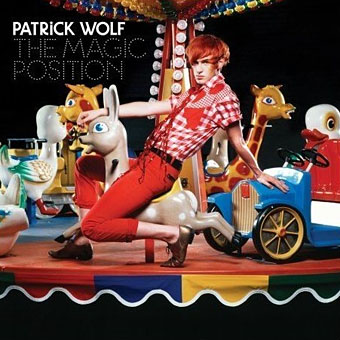‘There was a fire inside me’
His life was made a misery at school, but all that bullying just fuelled Patrick Wolf’s ambition to become a pop star. Looks like he will have the last laugh, says Maddy Costa.
The Guardian, Friday, February 9th, 2007
PATRICK WOLF was 11 when he saw his first dream shatter. Aged six, he had vowed to become a solo violinist. “I’d heard a violin solo by Rachmaninov on the radio,” he recalls, “and it was so divine my little brain thought: that’s what I want to do.” His parents had booked him piano lessons but he told them: “I don’t like this piano, it’s like playing a calculator.” Sadly, his orchestral career didn’t unfold as planned. “I was always second violinist. They do good harmonies, but I wanted to play that solo.”
To most people, playing second violin would be a fine achievement. But Wolf—a singer, songwriter and multi-instrumentalist—isn’t most people. You can tell by the way the 23-year-old is dressed for an average day ambling about central London. His gangly frame is clad in a checked shirt, knitted hoodie and tattered rabbit-fur jacket, his trousers rolled high above his thin gold shoes. His ash-brown hair is dyed burnt orange. Clearly, this man was born to be a pop star. And at the age of 11, disillusioned with his violin prospects, that’s what he decided to become.
It has taken 12 years and two uncompromising albums but Wolf is finally on the verge of the success he craved. Recently signed to a major label (Polydor subsidiary Loog), he’s about to release The Magic Position, an album of rapturous songs designed to soundtrack summer days and sunny adverts in which strangers hug in the street. The sleeve art captures the mood: it pictures Wolf posing on a carousel. Which hasn’t gone down too well in some quarters. “People think I’m trying to be Gary Glitter,” he says.
The trouble is that, whereas Wolf describes The Magic Position as “the most honest representation of how I live my life and what I want out of life”, the album couldn’t be more different from its two predecessors, Lycanthropy (2003) and Wind in the Wires (2005), both troubled testaments to his difficult youth. Wolf’s tale is one of bullying and depression, rebellion and melodrama, and he prefers to narrate it “with the music”. He’s been known to fabricate details: in early interviews, “I would make up stories about my life, until this legend emerged that I had been born in a lighthouse in Cork. It got out to my relatives in Ireland and I couldn’t live it down.” Since then, he admits: “It sounds quite arrogant, but I realised my life was more interesting than the fantasy.”
(Continues here)

